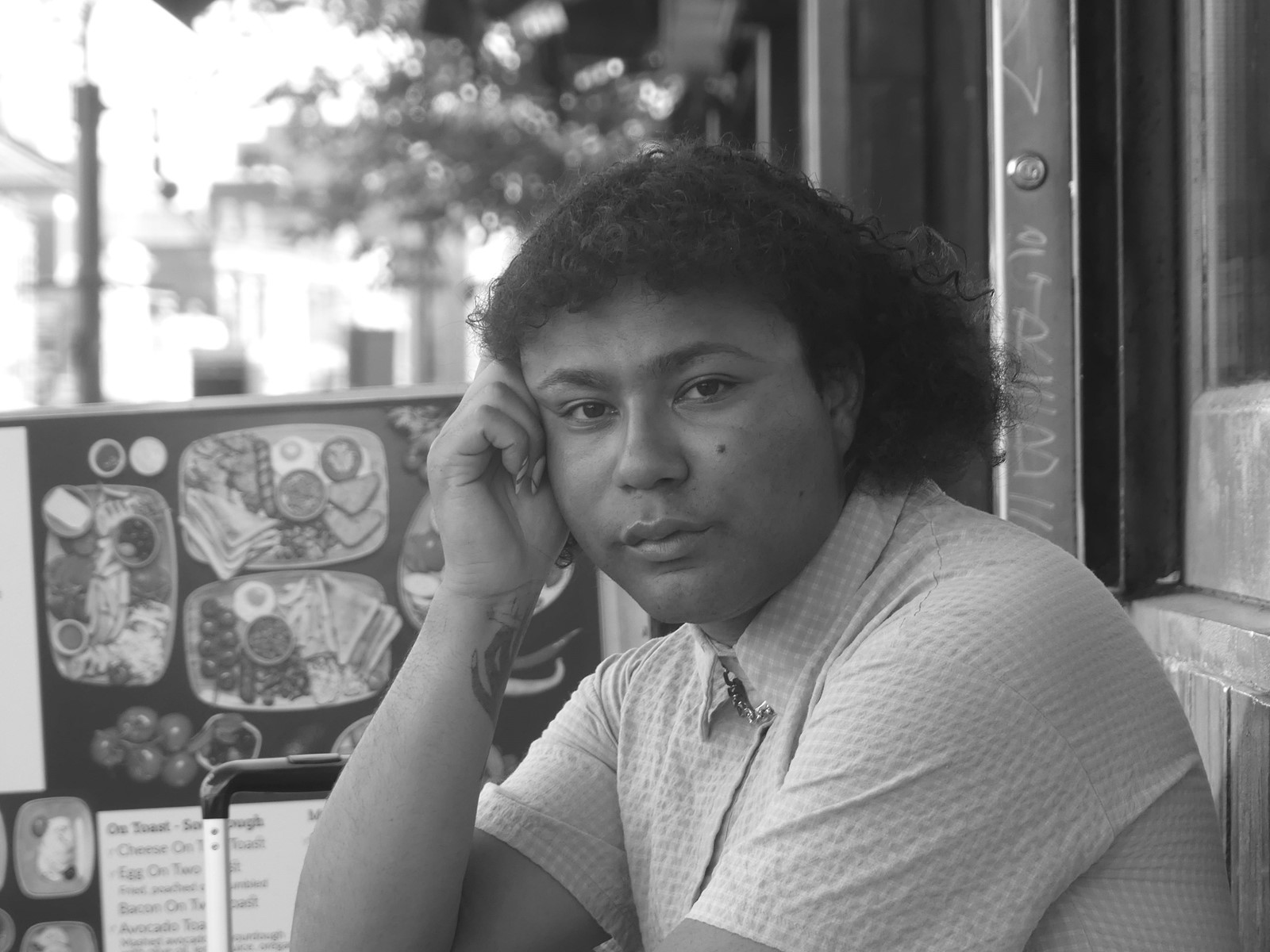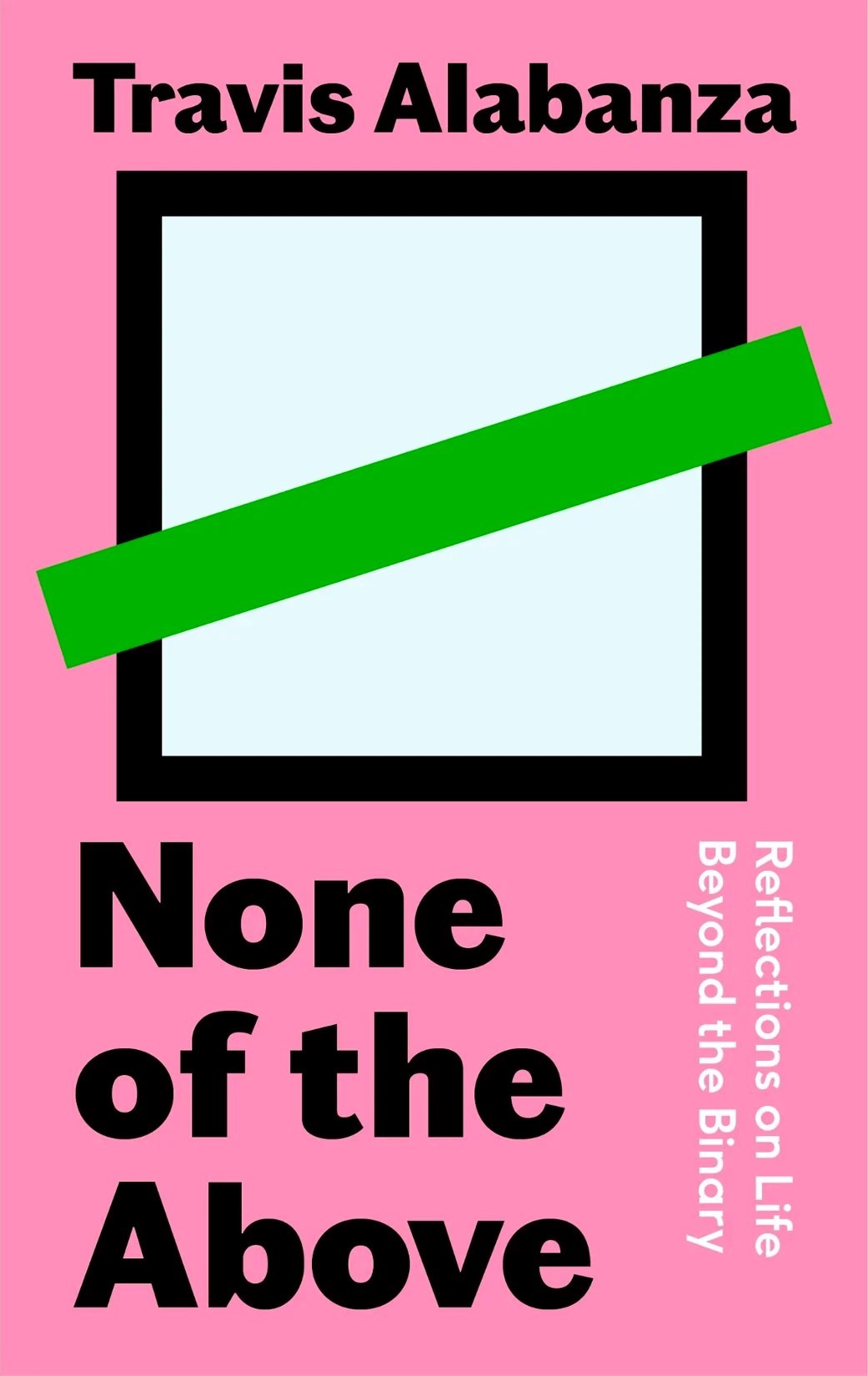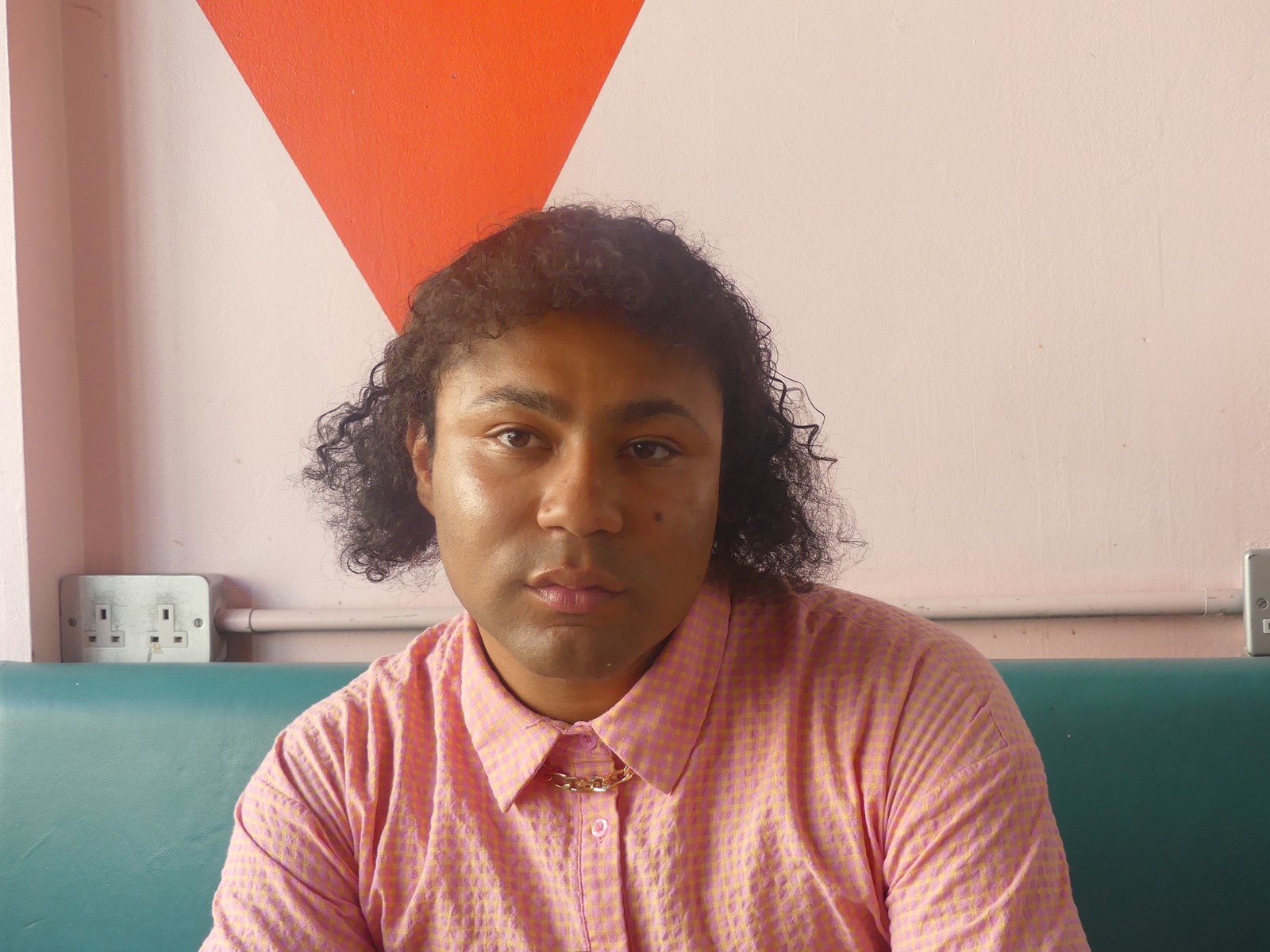Travis Alabanza is no longer interested in convincing anyone that being trans is valid. “I make art; it’s not my job to say the right thing all the time or to be a spokesperson,” they tell me in the smoking area of a queer bar in east London, one glaringly hot afternoon in July. Speaking to Alabanza, they are warm, erudite and razor-sharp – qualities which can be found in abundance in their debut book, None of the Above: My Life Beyond the Binary.
Born and raised in Bristol, Alabanza first rose to prominence in 2014 as a performance artist on London’s queer club scene. A couple of years later, they became the youngest person ever to be awarded an artist’s residency at the Tate. Their play Burgerz – inspired by a transphobic attack, in which someone threw a burger at them – debuted in 2018 to widespread acclaim and has since toured internationally to sold-out shows. Their most recent show, Overflow (2020), which is set in a public toilet and explores the idea of trans safety, also garnered rave reviews. While they have previously published poetry and essays, and written for the likes of Dazed, Vice, The Guardian and the BBC, None of the Above is their first full-length book.
Unlike a lot of contemporary non-fiction, much of which reads like an extended Instagram caption, None of the Above is a well-crafted and considered work of literature – which, considering Alabanza’s stature as a playwright, isn’t in the least bit surprising. While there is plenty about it that is empowering, it’s never platitudinous. Instead, their analysis of how gender is experienced in the world is nuanced, ambiguous and often unexpected in its conclusions. None of the Above rejects the idea that trans authors should be concerned, first and foremost, with making themselves legible to a cisgender audience. “I found myself wondering which people are afforded the ability to question themselves, to interrogate their feelings and write about their reality, without the end goal being the understanding of a certain group of people,” Alabanza writes in the prologue. At the same time, cisgender readers will find plenty to chew over: None of the Above makes a compelling case that the gender binary harms all of us, and that cisness, far from being fixed, is reactive and contingent.
The book is also very funny. There’s a humorous account of them winding up a wealthy donor at a charity function – who demanded ‘so, when did you first know?’ – by spinning an elaborate and at first plausible yarn, which ends with a three-year-old Alabanza visiting a doctor and saying their first words: “Doctor, I am actually a cross-dressing, gender non-conforming deviant.” Their interlocutor didn’t find this quite so amusing.
Here, Alabanza tells AnOther about the role that humour plays in their work, the neoliberal hijacking of gender politics, whether transness is a choice, and more.

James Greig: As a trans author, how do you feel about your work inevitably being read in the context of the anti-trans culture war which is so prominent right now?
Travis Alabanza: It feels like a trap that you can’t avoid. I actually started writing a completely different book which was information-heavy, instructive and modelled off Reni Eddo-Lodge [the author of Why I’m No Longer Talking to White People About Race] and Shon Faye [the author of The Transgender Issue]. But then, after reading Shon’s book, which is so great, I thought, ‘oh it’s already been done, I don’t need to do this,’ and deleted the whole thing.
I guess my way of avoiding the trap – although can you really? Who knows – is that in this book I am interrogating myself, and I would be doing that anyway, whether or not there was a culture war happening. I still would be asking these questions even if no one else was around.
JG: One theme that crops up throughout the book is the value in trying to have a conception of your identity which is separate from transphobia. Why was that important for you to interrogate?
TA: It was extremely difficult trying to do that, especially because I wrote the book while stuck inside during lockdown – it was impossible not to look at the news. But then I found myself thinking, ‘Shit, what could I think about if I wasn’t looking at this all the time?’ Trans people are so imaginative. If you go to the clubs or the performance world, which is where I’m from, you can see that imagination is happening left, right and centre. I wanted to translate that into a book.
That’s why the last chapter is titled This Is For Us Baby, Not For Them. I’m trying to ask, ‘What would transness feel like if we just stopped reacting? Is it possible? Can we do it for a brief moment?’ My gender looks and feels so different when I’m not trying to persuade anyone else when I’m not trying to make myself legible to others or worried about being misgendered, and instead asking what I’m actually feeling on the inside. That feels much more reminiscent of when I was younger: I’ve been out as [trans] for almost ten years, and I was way freer about it at the beginning, which is not the trajectory you might expect. But during the time I was writing the book, my relationship with my gender was stifled. And I think that can only be the result of this climate.
“My gender looks and feels so different when I’m not trying to persuade anyone else, when I’m not trying to make myself legible for others or worried about being misgendered” – Travis Alabanza
JG: In the book, you criticise the ‘born this way’ framing of transness as something innate. What is the problem with that framework?
TA: Maybe some people’s dysphoria was so strong that, from the moment they were born, it did feel like that. If that narrative is true for them, that’s great, but this reliance on it makes me nervous because it suggests that we are only asking for acceptance on the basis that we couldn’t possibly change. And that feels apologetic. I do feel like I chose this because in a parallel world there’s a version of me where I hid. Framing it as something that’s been out of my control since birth is so boring, and negates the power of making that choice in the first place.
Sometimes when identities are under heavy scrutiny, we build special rules around them to protect ourselves. But I just don’t want to be working from a place of protection anymore. I don’t want to make transness this special identity that you can’t critique. We’ve seen with identity politics, that just leads to bullshit, you know? It leads to a dialogue that isn’t healthy, and a situation where we are unable to make a class-based analysis of anything. That’s just what happens when an identity becomes this circle that you can’t touch – I guess I just wanted to burst that a bit.
JG: You write in the book about the neoliberal hijacking of gender politics. What does this look like
TA: Any time someone mentions I used the word ‘neoliberal’ in the book, I’m like, ‘ugh, I’m such a wanker!’ But when I was 16 and met the first person who said ‘I’m not male or female’, that was mind-blowing. It felt so punk. This person was saying that they were not opting into anything and that they were not definable. But now – within a liberal, capitalist framework – being non-binary has just become a third box: this is what non-binary looks like, this is how to be non-binary, here are five tips on how to support a non-binary person. If you break down what non-binary really means, how could you possibly have five tips to support such a wide group of people?

JG: So, do you don’t think ‘non-binary’ makes sense as a distinct category?
TA: You could gather ten non-binary people walking down a street and they would all experience gendered violence differently depending on how they are presenting. So it’s not an effective way to talk about violence and support. I’ve also been getting frustrated with the way ‘non-binary’ is being turned into a third gender, and its cooption by the state and the media. Even fighting for a non-binary marker on a passport feels like another way to contain what was, for me, something that couldn’t be contained.
Non-binary is going through its own identity crisis. I’ve stuck with it as a label as I believe in what it meant, for me, but I’m increasingly less interested in the conversations around it. None of it is linked to structural support, finances, violence, or work. That’s why, in the book, I use the word ‘visibly gender non-conforming’ a lot more than ‘non-binary’. No one is checking my pronoun badge before they harass me (not that I wear one).
JG: Why is ‘gender non-conforming’ a more clarifying term?
TA: It links us to other people. There are cis gay men and women who are gender non-conforming and that’s why violence is happening to them. My real tea is that I don’t give a fuck if someone knows my pronouns or not, as long as I’m not being attacked in the street. My family hardly ever gets my pronouns right, but I don’t really care because their actions are full of love. That might be different for other trans people and that’s totally fine, but my concern has always been about quality of life away from violence. That’s what I’m talking about in the book: safety.
“When I was 16 and met the first person who said ‘I’m not male or female’, that was mind-blowing. It felt so punk” – Travis Alabanza
JG: The book contains some harrowing descriptions of the violence and harassment which you experience regularly. What is it about gender non-conformity which makes people so angry?
TA: I think at a certain point in your life, you have to choose not to give it as much time. What was hard about this book was that, for the first time in ages, I had to give time to all the violence again. It was only after it was finished that I could turn it back into background noise again.
In the book, I’m trying to figure out why this happens, and in the last chapters I kind of conclude that I don’t know, and that being trans has to be separate from that. And again, this comes back to why I think seeing it as a choice is so important. It just has to be. You get dressed in the morning, you know what the consequences will be, and you choose to do it anyway. That’s why I don’t like the ‘born this way’ narrative – shut up, Gaga!
JG: I thought the book was at times very funny. What role does humour play in your writing?
TA: When people just know me from online, they often see me as a talking head for trans stuff. But anyone who’s seen my shows knows that it’s basically stand-up in a theatre. Most of my work is comedy – that is my practice. I have never felt less funny and more miserable than when writing this book, but of course, the version of me that makes jokes comes through. It goes back to the trap of being trans and putting anything out in public at the moment. It’s unfair that any of us are writing against this backdrop, but part of navigating that is holding onto the bits of you that are you. Humour is a big part of that for me.
JG: Do you feel the pressure to be a public spokesperson for trans issues and if so, how does that sit alongside your sense of humour?
TA: The thing is, I got made into a talking head – that was never my career goal. Realising that I don’t need to be sanitised or respectable was so liberating. I can reject this imaginary voice that says, ‘I shouldn’t say this in public because I need to be representing this, this and this.’ No, I don’t. When I started to gain a small public platform, my friends didn’t recognise me as that person: they were like, ‘bitch, you’re so rude and jokey in real life, and this feels like a CBBC version of yourself.’ The pandemic made me stop and realise that I didn’t want to do that anymore. [And in terms of how transphobes might react], it doesn’t make a difference. I had this realisation, ‘bitch, they think you’re a freak either way.’ I want to go to work and have fun.
None of the Above: Reflections on Life Beyond the Binary by Travis Alabanza is published by Canongate Books, and is out now.
